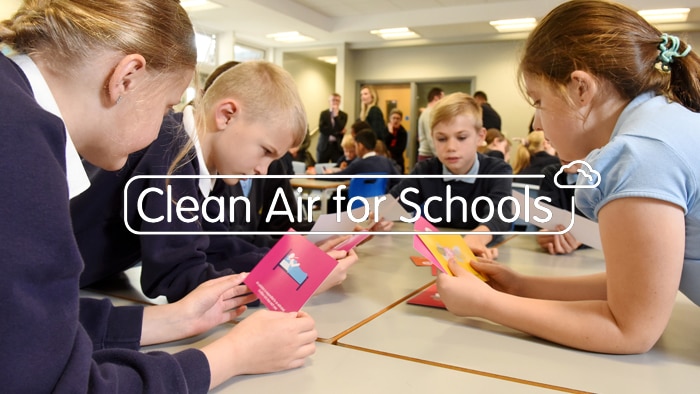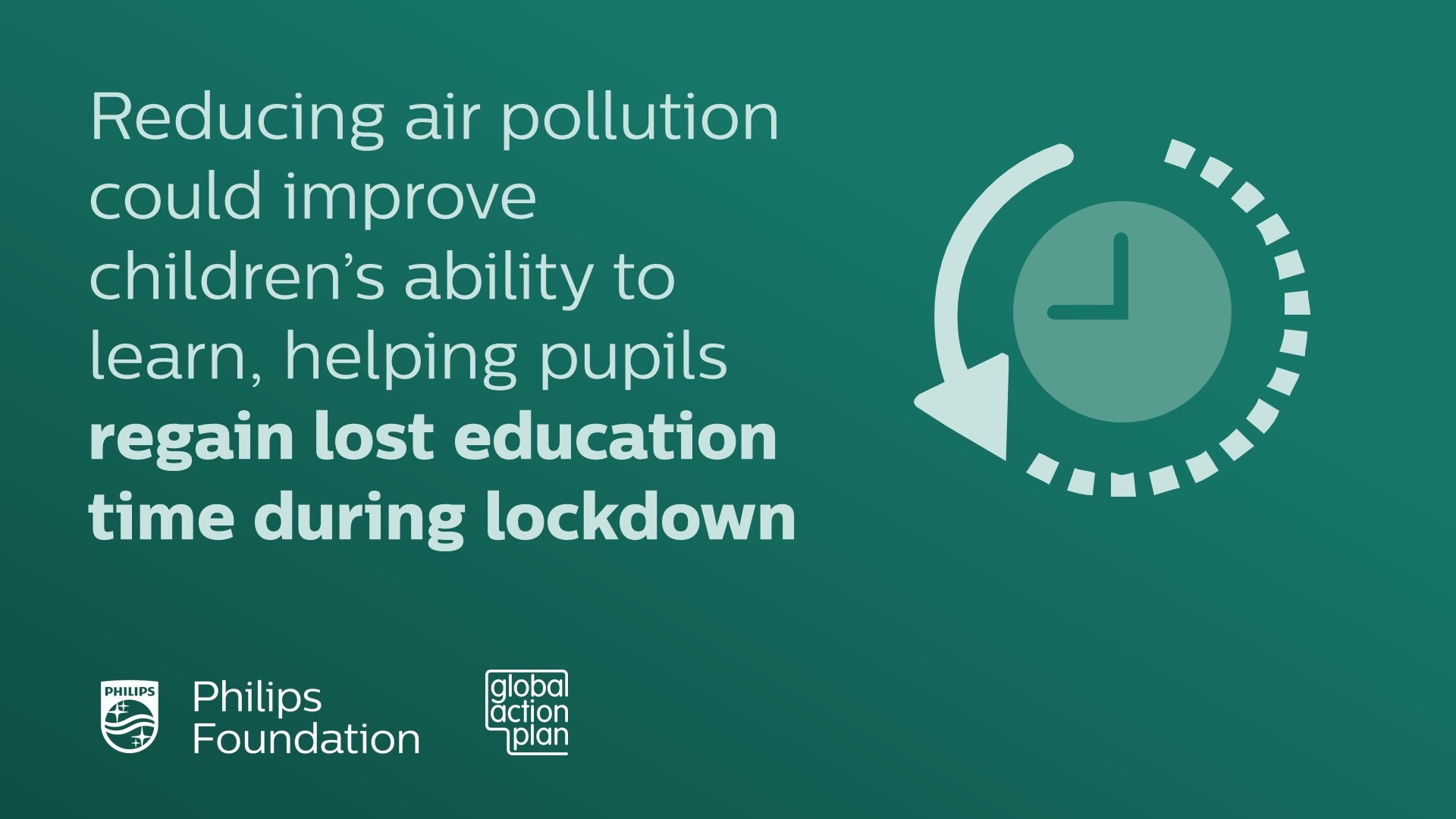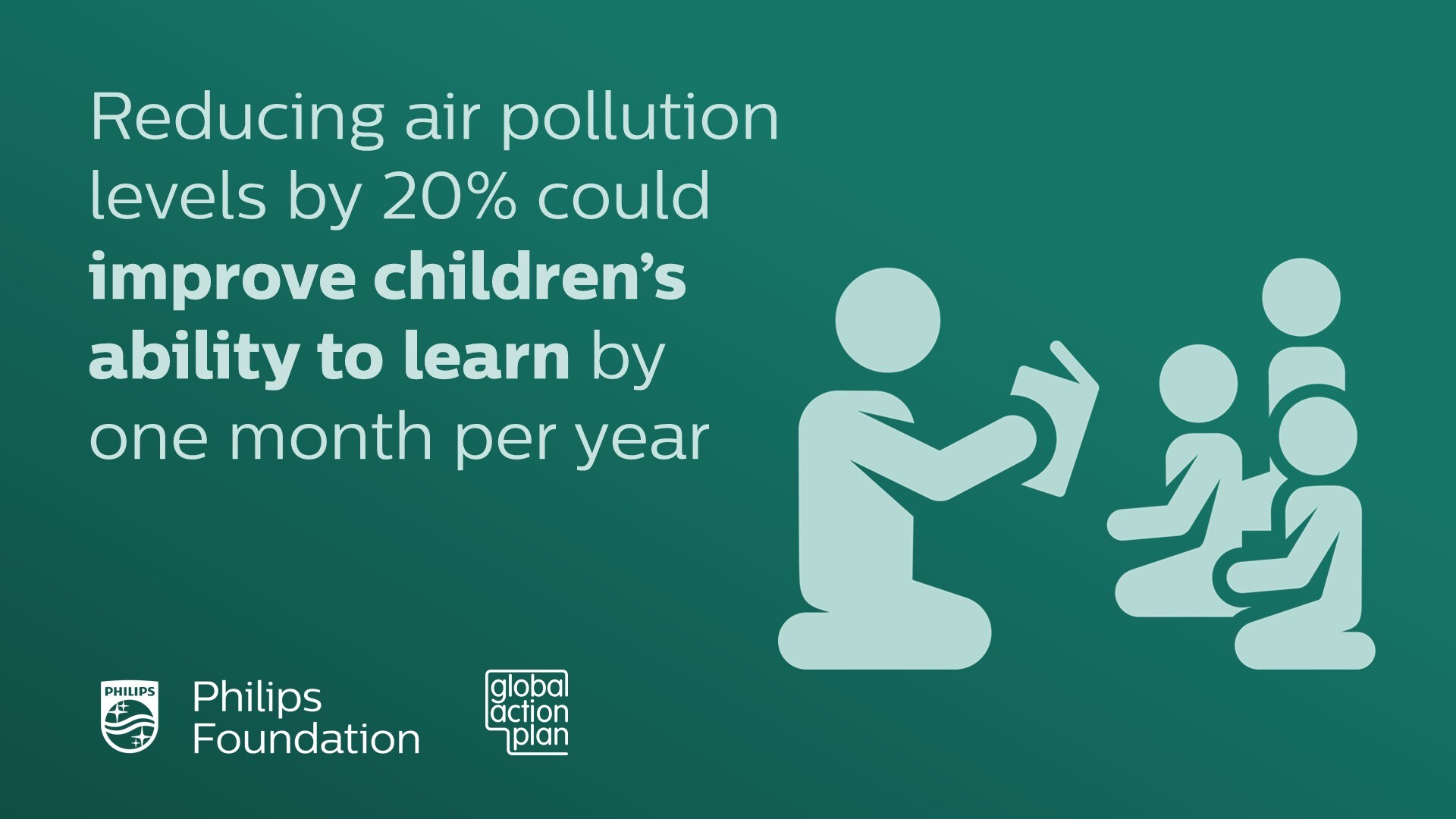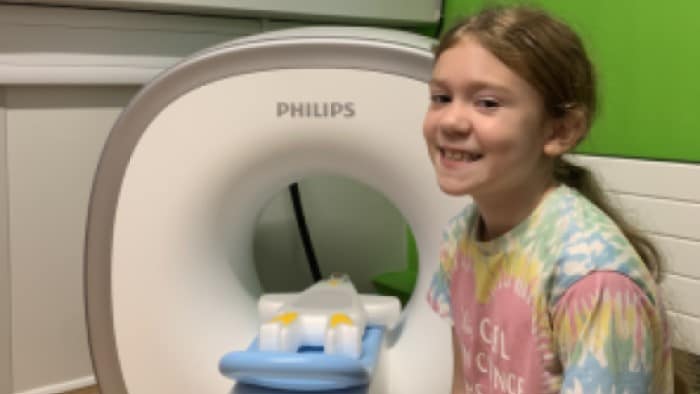Oct 08, 2020
Clean Air Day 2020: Reducing air pollution levels by 20% could improve children’s ability to learn by one month per year
8th October 2020 – To mark Clean Air Day 2020, the University of Manchester (UoM), on behalf of the co-ordinators of Clean Air Day, Global Action Plan, and the Philips Foundation, have published new modelling[i] demonstrating that maintaining lower indoor and outdoor air pollution (PM25 & NO2) levels could improve a child’s ability to learn. The model finds that maintaining lower air pollution levels in and around school grounds by 20% could enhance the development of a child’s working memory by 6%, the equivalent of four weeks extra learning time per year. The findings are part of the Clean Air for Schools Programme, a year-long research project which looked at how air pollution and its effects on children can be tackled in schools across the UK & Ireland. Launched in October 2019, the Programme includes additional field research undertaken in 19 schools totalling approximately 6,000 students across Greater Manchester, looking into the most effective actions for reducing indoor and outdoor air pollution. In addition to improving children’s health[ii], the Programme’s latest findings from the UoM modelling show that reducing air pollution will also improve children’s ability to learn, supporting teachers who are already under pressure to ensure pupils regain lost education time during lockdown.
An overview of the findings from the model, which estimates the impact of changes in indoor and outdoor air pollution (PM25 & NO2) on the development of working memory, are detailed in the below table:
| Outdoor air pollution (NO2) scenario: (Baseline: 40µg/m3 annual mean level) | Change in working memory over 12 months compared to no change in outdoor air pollution (NO2) | Amount time working memory is delayed/ improved over 12 months (NO2) | Change in working memory over 12 months compared to no change in outdoor air pollution (PM25) | Amount time working memory is delayed/ improved over 12 months (PM25) |
| Predictions | | | | |
| Decrease by 20% | +6.1% | Improved by 3-4 weeks | +5.1% | Improved by 3-4 weeks |
| Decrease by 30% | +9.1% | Improved by 4-5 weeks | +7.7% | Improved by 4-5 weeks |
| Decrease by 40% | +12.2% | Improved by 5-6 weeks | +10.2% | Improved by 6-7 weeks |
| Decrease by 50% | +15.2% | Improved by 6-7 weeks | +12.8% | Improved by 7-8 weeks |
| Increase by 20% | -6.1% | Delayed by 3-4 weeks | -5.1% | Delayed by 3-4 weeks |
| Increase by 30% | -9.1% | Delayed by 4-5 weeks | -7.7% | Delayed by 4-5 weeks |
| Increase by 40% | -12.2% | Delayed by 5-6 weeks | -10.2% | Delayed by 6-7 weeks |
| Increase by 50% | -15.2% | Delayed by 6-7 weeks | -12.8% | Delayed by 7-8 weeks |
Air quality data by Department for Environment, Food and Rural Affairs (DEFRA) shows air pollution decreased by up to 40% on average across the UK in peak national lockdown during April and May 2020 compared to the same time last year[i]. In light of this, the campaigning group urges that it is viable to maintain a 20% reduction around school grounds through actions included in the Clean Air for Schools Framework. Actions include School Streets, which when enrolled in the London Borough of Hackney, one of the leading community grassroots initiative proactively tackling air pollution, traffic reduced by an average of 68%, the number of children cycling to school increased by 51% and vehicle emissions outside schools (NOx, PM10 and PM25) are down by 74%[ii]. Based on the modelling by UoM, even a 20% increase in air pollution could stunt the development of a child’s working memory by up to four weeks per year. Up to 2,000 schools and nurseries are close to roads with air pollution above the baseline level of NO2 used in the model[iii], meaning that at least 500,000 children are exposed to levels of pollution that would affect working memory. But the impact is also felt at lower levels than the 40µg/m3 baseline and so many more thousands of pupils also stand to benefit from a reduction in pollution. In terms of PM25, the most recent national investigation found that 8,549 schools, colleges and nurseries are in places with pollution levels that are above WHO health limits[iv], equating to at least 1.7 million children in these locations. However, the exact number of pupils held back by excessive pollution is unknown because there is no national monitoring system for air quality in schools. To encourage urgent action, campaigners including support from the All-Party Parliamentary Group on Air Pollution (APPG), National Education Union (NEU) and National Association for Head Teachers (NAHT), are calling on the government, local councils to guide schools in using the newly launched “Clean Air for Schools Framework”. The Clean Air for Schools Framework, developed by Global Action Plan, the Philips Foundation and the UoM, is a free online tool that gives teachers, headteachers, parents and local authorities a bespoke blueprint of actions for tackling air pollution in and around the school. Its database of actions includes interventions that can be taken both inside and outside school grounds including implementing school streets, improving indoor ventilation and consolidating deliveries. At a time when schools are urgently reviewing their operations, implementing major changes to the movement of pupils and parents on their premises, the group is calling on all schools across the UK & Ireland to adopt and implement the framework, with support from local and national government. All actions in the Clean Air for Schools Framework have been vetted by existing research, academic insights and in-school air quality testing by the University of Manchester and further refined in collaboration with teachers and students. Notably, in classroom research conducted at Russell Scott Primary School in Greater Manchester found that using an air purifier over a short period of time can reduce levels of indoor air pollution (PM25) by up to 30% in classrooms.
Chris Large, Co-CEO at Global Action Plan says: “ This year long research project has uncovered the effects air pollution has on our children’s ability to learn, as well as their health. Given lockdown restrictions have already impeded learning time, we must give all children a fighting chance, especially those in pollution hotspots who are also likely to be victims of the attainment gap. The new Clean Air for Schools Framework is now available for free to help any school set up a clean air action plan, but schools cannot do this alone. We ask the government to bring together all parties with potential solutions – NGOs, local government, education leaders and businesses – to combine under one national effort to eliminate harmful pollutants from schools.” Mark Leftwich, Director, Personal Health, Philips UK and Ireland: “Every child has the right to learn in a safe working environment which not only protects their health, but also safeguards their ability to learn and shape their future prospects. It is imperative that we take immediate action to protect the futures of our children who have already experienced severe disruption to their learning over lockdown and cannot afford to be held back any further. As a society, we already have many practical tools at our disposal to tackle air pollution and with schools, parents and local authorities working together, we can put them into place today, ensuring this generation of schoolchildren have the best possible learning environments we can give them. We therefore urge the UK Government to encourage all schools to adopt the Clean Air for Schools Framework.” Prof Martie van Tongeren, Professor in Occupational and Environmental Health, University of Manchester: “Pollution of indoor and outdoor air affects the health of our children. In addition, the available evidence indicates that it affects their cognitive development, which may affect educational attainment. Studies that investigate the link between exposure to air pollution during early life and effects of educational attainment and brain health at later life are urgently needed and policies should be set out by ministers to tackle this urgent challenge, immediately.” “Improving air quality in and around schools will benefit child’s health and educational development should be a priority for government, local authorities and schools.” The Mayor of London, Sadiq Khan: “I am doing everything in my power to stop Londoners breathing air so filthy that it damages children’s lungs and causes thousands of premature deaths. The Ultra-Low Emission Zone has already cut toxic air by a third and led to reductions in roadside nitrogen dioxide that are five times greater than the national average. We recently launched our School Streets air quality monitoring project and are funding 430 new School Streets as part of our world leading Streetspace plan. This will play an important role in enabling parents and children to walk, cycle or scoot to and from school which has so many benefits, not least in improving air quality. We know there is still more to do, and the task is made all the more urgent by emerging evidence of the link between air pollution and the worst effects of COVID. Pollution is not just a central London problem which is why I am committed to expanding the ULEZ next year. I have consistently demanded that the government match my ambition and improve the environment bill to include legally binding WHO recommended limits to be achieved by 2030, and to give cities the powers they need to eradicate air pollution.” Greater Manchester, Director of Public Health, Eleanor Roaf: “This year, during lockdown, one of the very few positives was the improvement in our air quality. We’re in danger of losing these gains, but if we all try and change our habits, and in particular, walk and cycle for as many of our shorter journeys as we can, then we’ll reduce congestion and improve air quality, which will not only improve our health but also reduce our covid-19 risk. We encourage all schools in Greater Manchester to harness the free Clean Air for Schools Framework to eliminate harmful pollutants from in and around the school premises.” Councillor Tom Hayes, Deputy Leader, and Cabinet Member for Green Transport and Zero Carbon Oxford, Oxford City Council: “Clean air is a right that everyone should be able to experience. In Oxford we understand the impact air pollution can have on young people and have been working with schools across the city on our award winning STOP campaign, to help raise awareness of the effects on health. Through helping to share the impact of air pollution with children and young people we can help embolden them to share their views and become the voices of the future. The Global Action Plan Clean Air for Schools Framework will help schools and local authorities across the country to help to educate our future leaders on how they can tackle air pollution in their local communities and beyond. I encourage all schools and local authorities to support this framework.” Geraint Davies, APPG on Air Pollution: “For Clean Air Day we should all be working hard to reduce our air pollution. Since young people are most vulnerable to the effects of air pollution it is important that we focus on areas around schools and parks where young people spend most of their time. It will ensure they are not only physically healthier, but studies show that better air quality improves concentration and memory in young people, which leads to higher attainment at schools. It is therefore vital when we think about education, we consider the learning environment and make it pollution free.” Steve Marsland, Head Teacher, Russell Scott Primary School: “Wow! I knew the Philips Air Purifiers would make a difference to the quality of air in our classrooms but to reduce particulates in the air by almost a third is amazing! Until the University of Manchester surveyed the air quality prior to the project we had no idea how poor the air quality was. Our school is in a particularly polluted area because of the numbers of roads, retail park and two motorways running past us that you almost accept that this is your lot and you learn to live with it. The Clean Air Project has proven that we don’t have to live with it.” Sarah Hannafin Senior Policy Advisor NAHT: "One thing the Covid-19 crisis has shown us is that we can do things differently. As we now begin to try and return to a more normal way of life it's important we don't just automatically take up old habits but try to use this opportunity to find better options, for ourselves and the planet. We would encourage schools to use this new framework and to consider working with children, families and local partners to create a clean air action plan to tackle air pollution in and around the school.” Kevin Courtney, Joint General Secretary, National Education Union: “The NEU continues to be hugely concerned about the impact of air pollution on children and therefore welcomes this new resource which will help raise awareness of the impact of air pollution and also help schools to take practical steps to improve their own environment”.
[1] The model, developed by the UoM, is based on results from a literature review, in particular a Spanish longitudinal study of air pollution and cognitive performance in primary school children, from which the researchers were able to estimate the impact of changes in outdoor air pollution (NO2) on the development of working memory. [3] Air quality data by Department for Environment, Food and Rural Affairs (DEFRA). [4] Hackney School Streets case study: https://news.hackney.gov.uk/traffic-to-be-banned-outside-40-schools-as-part-of-emergency-plan/ [5] Greenpeace Investigations Unit, 2017 [6] https://www.asthma.org.uk/about/media/news/schools-surrounded-by-pollution/
About Royal Philips
Royal Philips (NYSE: PHG, AEX: PHIA) is a leading health technology company, focused on improving people’s health and enabling better outcomes across the health continuum from healthy living and prevention to diagnosis, treatment and home care. Philips leverages advanced technology and deep clinical and consumer insights to deliver integrated solutions. Headquartered in the Netherlands, the company is a leader in diagnosis imaging, image-guided therapy, patient monitoring and health informatics, as well as in consumer health and home care. Philips’ health technology portfolio generated in 2016 sales of EUR 19.5 billion and employs approximately 81,000 employees with sales and services in more than 100 countries. News from Philips is located at www.philips.com/newscenter













